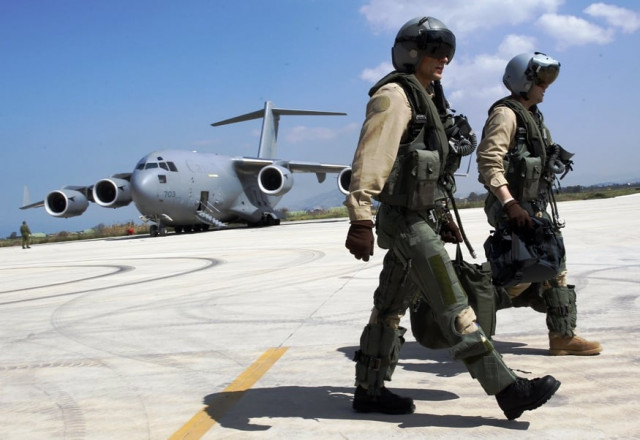Rebels seize border post, NATO warns Libya civilians
The capture of the Wazin border post was cheered by several hundred rebels who raised the flag of the Libyan monarchy.

The capture of the Wazin border post was cheered by several hundred rebels who raised the flag of the Libyan monarchy after some 150 to 200 pro-Qaddafi soldiers abandoned their weapons and fled into Tunisia.
Some insurgents paraded in the bucket of a bulldozer and dozens of rebel vehicles were present at the border post, located about 200 kilometres south of the main Tunisian-Libyan crossing at Ras Jdir.
Rebels have been pinned back by government troops for more than three weeks in the east of the country and have suffered heavy losses in Misrata, which has been pounded for more than six weeks in fighting which a doctor said had claimed at least 1,000 lives.
Among the latest to die in Misrata, some 215 kilometres west of Tripoli, were 41-year-old Tim Hetherington, an Oscar-nominated British film director and war photographer, and award-winning US photographer Chris Hondros, also 41.
The two photographers were hit by a mortar on Wednesday while covering fighting in Misrata's Tripoli street, the frontline in a bloody battle for control of the city, witnesses said.
Government spokesman Mussa Ibrahim told reporters in Tripoli that Libyan troops were not to blame for the deaths of the two photographers.
"We are very sad for the loss of any human life even from the rebel side, so we're really sad for the loss of these two lives," Ibrahim said, adding, "It's not the responsibility of our army."
NATO warned civilians to avoid getting close to Qaddafi's troops, as it pursues a UN mandate to protect non-combatants while enforcing a no-fly zone over Libya.
"Our planners and pilots go to very great lengths to ensure we do all we can to reduce the risk to civilians when we attack targets, but the risk cannot be reduced to zero," the general in charge of NATO's operations said in a statement from Brussels.
"Civilians can assist NATO by distancing themselves from Qaddafi regime forces and equipment whenever possible," Lieutenant-General Charles Bouchard said.
"Doing this will allow NATO to strike those forces and equipment with greater success and with the minimum risk to civilians," the statement said.
NATO's warning came as Libyan official media reported seven civilians killed and 18 wounded in an alliance air raid that targeted the southwestern Tripoli suburb of Khellat Al-Ferjan late on Wednesday.
NATO said on Thursday however it had no indications that its raid on the suburb killed civilians, saying the target was a command and control bunker in a military compound.
State news agency Jana said a number of civilians were also killed in NATO air strikes on Thursday on the Libyan town of Gharyan, 90 kilometres southwest of Tripoli.
There was no independent confirmation of the report.
In Paris, Libyan rebel leader Mustafa Abdel Jalil said the insurgents expect "major strikes by the coalition" against Qaddafi's forces.
"We are sure that Qaddafi will be overthrown sooner or later, but we want it to be as soon as possible," Jalil told French TV Wednesday after meeting with French President Nicolas Sarkozy.
Asked whether the conflict would be won by force or negotiation, Jalil, who heads Libya's Transitional National Council (TNC), told France 24: "We expect there to be major strikes by the coalition, then Libyans can reach a solution."
Rebel leaders in Misrata have pleaded for foreign soldiers to help them battle Qaddafi's forces, saying the air strikes are not enough to dislodge troops hiding in civilian areas and fighting street by street.
France, Italy and Britain have said they would send military personnel to insurgent-held eastern Libya, but only to advise the rebels on technical, logistical and organisational matters and not to engage in combat.
Russian Foreign Minister Sergei Lavrov on Thursday warned against a Western ground operation in Libya, saying it would be an "extremely risky" action with unpredictable consequences.
Massive Libyan protests in February inspired by the revolts that toppled longtime autocrats in Egypt and Tunisia escalated into war when Qaddafi's troops fired on demonstrators and protesters seized several eastern towns.
The battle lines have been more or less static in recent weeks, however, as NATO air strikes have helped block Qaddafi's eastward advance but failed to give the poorly organised and lightly-armed rebels a decisive victory.
The capture of the Wazin border post marked the first time since March 28, when rebels swept through a string of towns in the east under cover of allied air strikes that the outgunned insurgents have made any headway against Qaddafi's forces.
The gains in the east were quickly reversed and the rebels were pushed almost all the way back to their bastion in Benghazi.






1726734110-0/BeFunky-collage-(10)1726734110-0-208x130.webp)












COMMENTS
Comments are moderated and generally will be posted if they are on-topic and not abusive.
For more information, please see our Comments FAQ